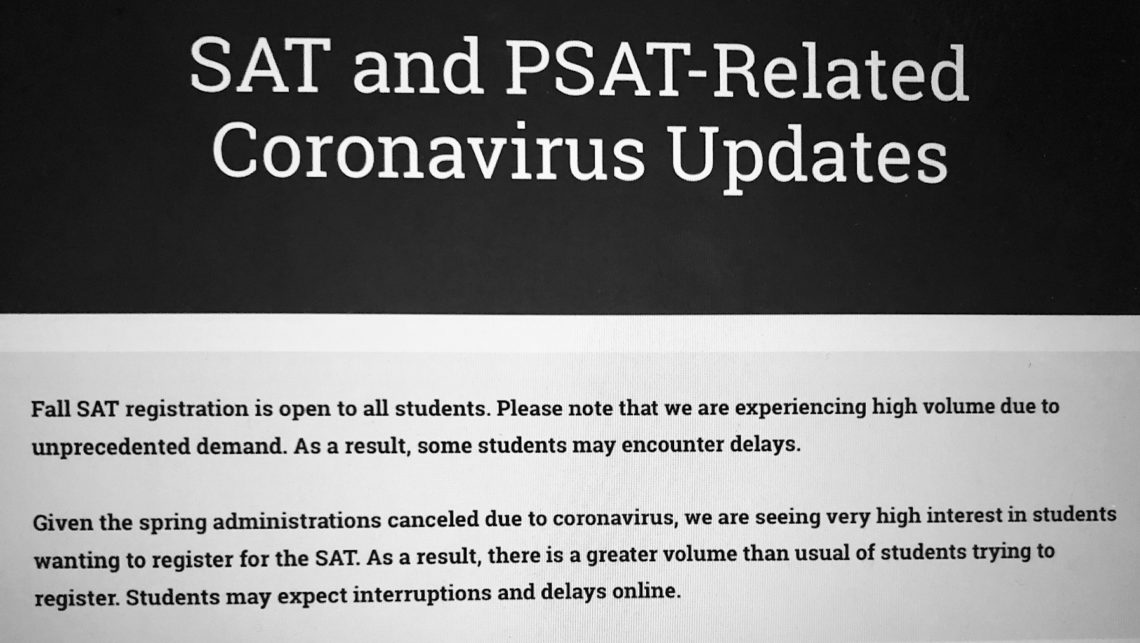This Pandemic Should Make Universities Go Test-Optional…For Good
By Lauren Larsen
For nearly a century, most prospective college students have been required to submit standardized test scores as part of their application; however, in the wake of the coronavirus pandemic, that has all changed.
Spring SAT and ACT test dates have been cancelled due to social distancing and stay-at-home orders. Every year, juniors strive to take these tests multiple times in order to superscore and submit their best possible mark to college. With that opportunity lost and postponed to the fall due to COVID-19, many colleges have made the bold yet necessary decision to go test-optional for the high school class of 2021, acknowledging the unique challenges they experience.
California State Universities have decided to go test blind for the next application cycle so long as students have a GPA of 2.5 or higher. The UC system also went test-optional for rising seniors and then will go test blind the year after.
Other schools going test-optional include Boston University, Columbia University, Dartmouth College, Cornell University, Northeastern University, Rochester Institute of Technology, Tulane University, University of Pennsylvania and Villanova University.
Though several Virginia schools are now test optional, such as University of Virginia, Virginia Tech, Washington and Lee University and University of Richmond, test optional policies aren’t new in Virginia. These colleges will join George Mason University, which has been test optional since 2006. Virginia Commonwealth University changed SAT/ACT requirements in 2014, with University of Mary Washington and James Madison University following suit in 2015 and 2017.
Other universities such as Fordham University, Tufts University, Elon University, Davidson College, Oberlin College and University of Cincinnati announced a multi-year test-optional pilot program for students.
The College of William and Mary will go test-optional for three years and review afterwards.
“Given the uncertainty of the current testing climate, we believe this is imperative in responding to applicants’ needs,” said W&M Dean of Admission Tim Wolfe, “By providing the added flexibility of a test-optional process, we seek to support students by assuring them that they’ll be able to confidently apply through our holistic review process with or without SAT or ACT scores.”
This shift from prioritizing standardized test scores to placing less emphasis on numbers should remain a trend well after COVID-19. The SAT and ACT have been used by universities to “filter” students through the initial steps of the application process. These tests are especially useful as the number of applicants per institution has been growing every year; but at what end?
Standardized test scores leave out the character of each student. The first impression an admissions officer has of a student is merely a number; thousands of applicants are labeled like a prisoner in an academic incarceration system. Without SAT/ACT scores, students have more opportunities to show their interest for schools they are applying to, what passions that student has and how a student will use that university education to learn and become a strong member of society.
There is a section of the Common Application where students can list their extracurricular activities, submit their transcript and write their essay, but at a lot of top universities, those parts of the application are likely never considered if standardized test scores aren’t up to par.
If a student takes the time to research a school, look at its various programs and degrees, and choose to spend $50 to $90 on an application, that university should be open to learning about the student just as the student was for the university. Unfortunately, standardized tests prohibit that; colleges should distance themselves from such strict cut-offs and requirements.
This issue extends far beyond universities however. In 2019, the College Board made the SAT test and the essay cost $64.50 ($93.50 if registering late). Over 2.2 million students took the SAT last year. If students were interested in receiving score reports, that cost $12 and an additional $31 for two-day processing (optional). Annually, the College Board makes over 1 billion dollars; a large sum of that comes simply from testing fees from SATs, AP exams and subject tests.
Students deserve to be evaluated beyond a 1600 point grading scale. My hope is that colleges learn from this fall application cycle about the value of looking at the nature of a student rather than the number of a score. If this pandemic has taught us anything, it has taught us about the incredible ability of humans to rise to the occasion and work for the betterment of others over oneself. Let’s just hope that educational institutions can do the same.



